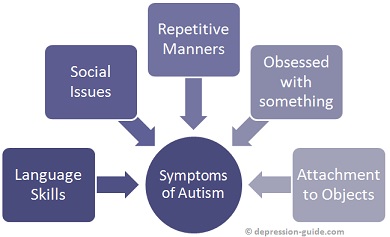Autism Symptoms and the Important Early Signs You Need to Know
TweetIt Can Occur Early
Many parents are concerned about whether or not their children could develop autism. There are many signs that can be found in people at an early age. Finding these signs ahead of time can work to help with supporting treatments that can keep this problem from being more substantial than it could be. Here are some of the main categories involved with this condition.
Language Problems
There are many signs that relate to language in mind. For example, a person who has autism may not be able to learn how to speak as early as others. A child who does not start talking under after one’s second birthday will be more likely to develop this disorder. A person who speaks with a unusual rhythm or tone or someone who can repeat phrases but not understand how it works could end up developing autism.
Social Problems
There are some social problems as well. For example, a child with autism may be more likely to have a tough time with eye contact with other people. A child can also refuse to be cuddled or handled. There are even cases where a child may prefer to be alone when playing.
Behavior Concerns
Some points with regards to behaviors should also be reviewed. For example, a child with autism will be more likely to act in repetitive manners and follow different types of routines. There are even cases where a child might be fascinated by specific parts of items and not the entire item.
Also, children with autism can be oblivious to pain or other things around them. They may even be sensitive to light and sound among other things. These could suggest that a child is willing to be more content with one self and refuses to communicate with other people regardless of what is going on in an area.

Signs and symptoms of inflexibility in autism
Children with ASD or Autism are many a times restricted, inflexible, and sometimes obsessive in their behaviors, outlook, interests and acts. They follow a very rigid routine and do not deviate from that routine. For example - they will always insists on taking the same seat in the bus and want to go with the same bus using the same route.
- They have huge troubles in adapting to changes in school or environment, etc. They throw lot of tantrums when they think or see that something has changed from its usual pattern or setting.
- They have some kind of attachment with toys or different objects like keys, switches, hair bands, etc.
- They, many a times, lines up items in a certain pattern or order.
- They are highly obsessed with narrow topic of interest such as numbers or symbols for example, they remember and tell the phone numbers, sports related statistics, train number and schedule with fare.
- They like watching objects which are in motion for example ceiling fan, wheels of a small car, etc.
- Repeats same movement constantly like clapping hands, etc. Researchers and clinicians have an opinion that this kind of behaviors sometimes soothe children with autism.


Sometimes crying or laughing
are the only options left,
and laughing feels better right now.

Current Issue
 Self Help Leaflets Take the help of our self help leaflets or booklets. |
 The DG Magazine All about living with depression |
Know more on Autism
- Autism Spectrum Disorders
- Autism Symptoms and Early Signs
- Autism Rating Scale
- Helping Children with Autism
- Repetitive Behavior
- Autism
- Autism in Early Years
- Autism Friendly Environment
- Bullying and Autism
- Living with Autism
- PDD - NOS
- Myths Facts and Statistics of Autism
- A guide for adults
- Can Autism be prevented?
- Speech problem with autism
- Autism and Ageing
- Medication for autism
- Treatment
- History
- Diagnosis
- Conditions associated with autism
- Sibling
- Autism and Stress
- Facts and Statistics
- How to Choose the Right School for Your Child With ASD












